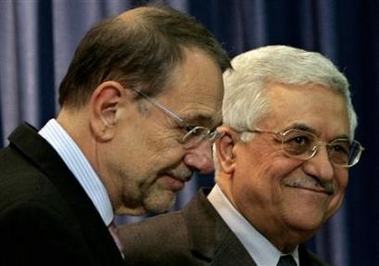Palestinian President Mahmoud Abbas moved closer to a showdown with the Hamas
government on Tuesday after he called for a referendum on a statehood manifesto
that implicitly recognizes Israel.

EU foreign policy
chief Javier Solana (L) and Palestinian President Mahmoud Abbas attend a
news conference in the West Bank city of Ramallah June 5, 2006.
[Reuters] |
The referendum, expected in July, will be seen as a confidence vote in the
two-month-old government and its policy of refusing to recognize Israel, which
has led the West to impose crippling sanctions on the Palestinian Authority.
Although Hamas convincingly beat Abbas's Fatah in January elections, opinion
polls suggest most Palestinians support the manifesto which the president is
putting to a referendum.
Abbas will meet the executive committee of the umbrella Palestine Liberation
Organization (PLO) at 11.00 a.m. (0800 GMT) on Tuesday to discuss setting a date
for the vote.
Abbas's office announced late on Monday that he would call the referendum
after last-ditch talks with Hamas foundered.
Hamas has rejected the manifesto as it stands and said a referendum would be
illegal so soon after the parliamentary election. The Islamic militant group
took office in March and have been locked in a power struggle with Abbas ever
since.
"We're approaching very tragic days," said Palestinian political analyst
Bassem Ezbidi.
Abbas, a moderate, stunned Hamas late last month by giving the group an
ultimatum to back the proposal, written by Palestinian prisoners in an Israeli
jail, or face a referendum.
Although opinion polls favor Abbas, if the referendum goes against him it
would be seen as a vote against Fatah policies of negotiation with Israel. The
government might ask Abbas to step down and urge him to call new presidential
elections.
The manifesto calls for a Palestinian state on all the land occupied by
Israel in the 1967 Middle East war.
The most Hamas has proposed is a long term truce if Israel gives up the West
Bank and East Jerusalem, far short of meeting the demands of Israel or Western
countries.
Some analysts believe passage of the referendum would allow Abbas to sack the
government to remove the sanctions and to clear him to pursue his plan for
negotiations with Israel.
With shootouts between Hamas and Fatah now frequent occurrences, many
Palestinians fear further violence.
Clashes between Hamas and Fatah gunmen have killed nearly 20 people in the
Gaza Strip in the past month.
"Hamas will work on two fronts, it will flex its muscles in Gaza and this
could get bloody, or they will boycott the referendum. I think they will favor
the boycott," said Ezbidi.
Israel rejects the prisoners' proposal outright. It has long insisted on
keeping large Jewish settlement blocs in the occupied West Bank.
Hamas seeks to destroy Israel and has rejected Abbas's calls to hold talks
with the Jewish state.
Opinion polls have shown more than three quarters of Palestinian voters
support the proposal by the prisoners, who are widely respected in Palestinian
society.
Abbas was elected by a landslide in early 2005 in a ballot Hamas did not
contest.